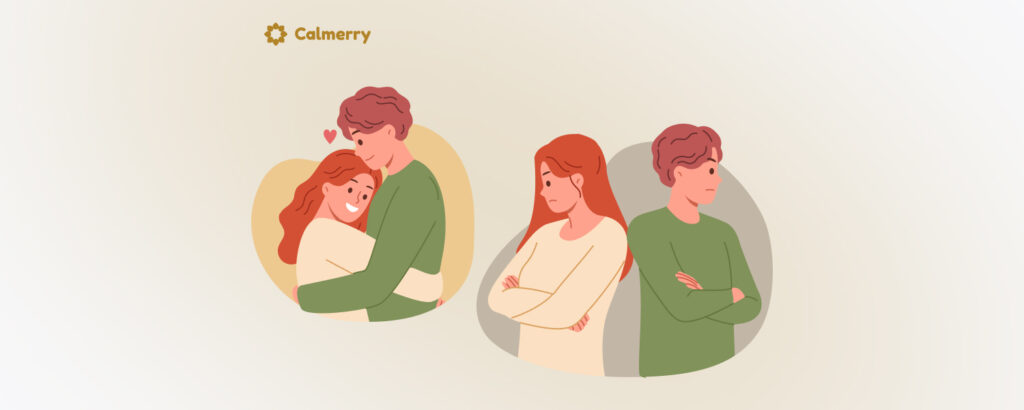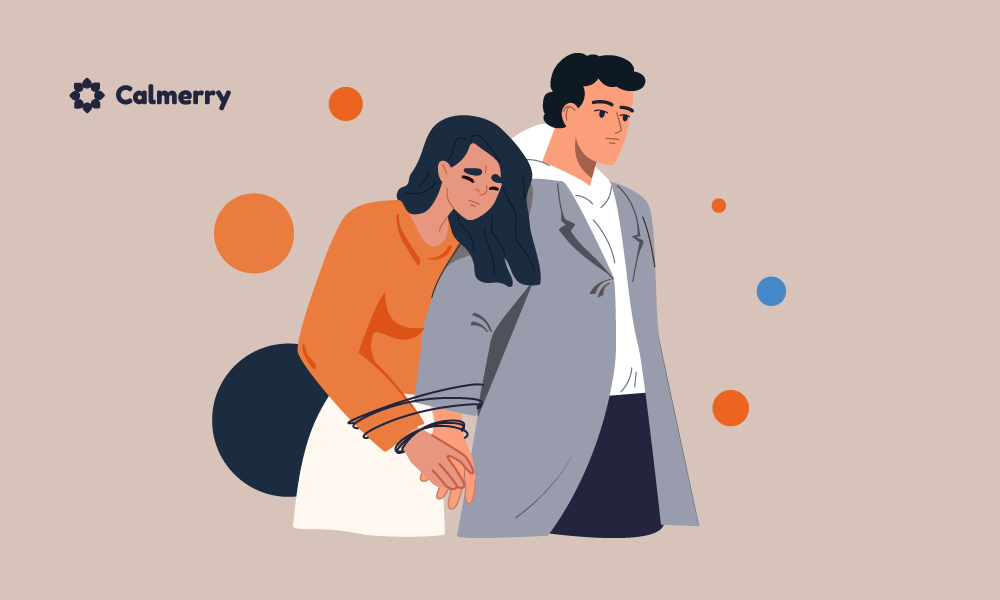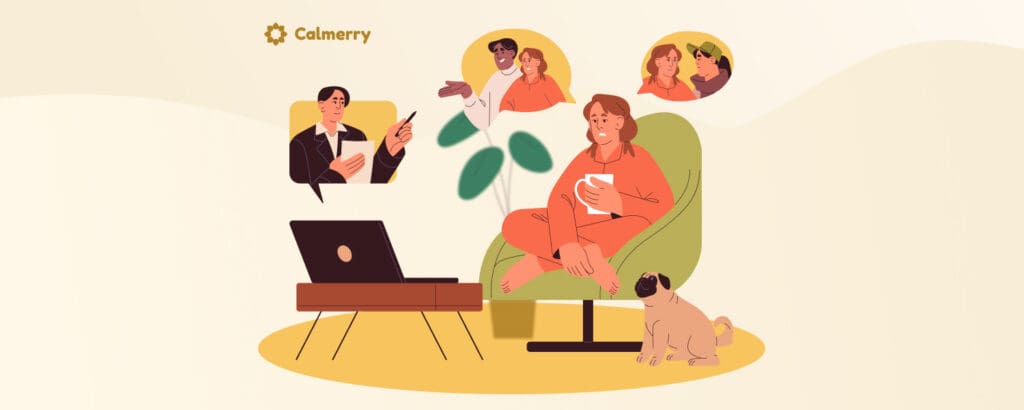How to Stop Being Codependent and Develop Self-Reliance

In this article
Do you find yourself always putting others first, to the point where it starts to affect your well-being? Do you feel like you’re the only one doing the work in your relationship? Do you stay in relationships even when they’re toxic because you can’t bear to be alone and not devote yourself to others?
If so, these might be signs that you’re codependent. But you’re not alone.
Being codependent is more than just being “needy.” Codependency is “setting yourself on fire” to keep your loved one warm because you believe you won’t be okay without them. Unconditional self-sacrificing might be your way of expressing love – and you might not know it yet, but it’s an unhealthy relationship pattern.
The good news is that you can change it. Together with Diamond Thaxton, a Licensed Mental Health Counselor, we share 7 expert strategies on how to overcome codependency.
What is codependency?
The term “codependency” gets thrown around mostly in recent years. It doesn’t have a clinical definition and isn’t recognized as a mental health disorder.
However, mental health professionals, including therapists, use the term to describe codependency as a dysfunctional pattern of behavior in which one person or both people overly rely on another one or each other for all their emotional and mental well-being and even a sense of self.
Codependency is common in romantic relationships. But it can also occur in any relationship, including friendships, family, and even co-workers.
Why is codependency unhealthy?
Generally, codependent relationships are often characterized by an imbalance of power and control, with one person becoming the “giver” and the other person becoming the “taker.” This can create an unhealthy dynamic where one person feels like they can’t function without the other and feels responsible for their feelings and actions.
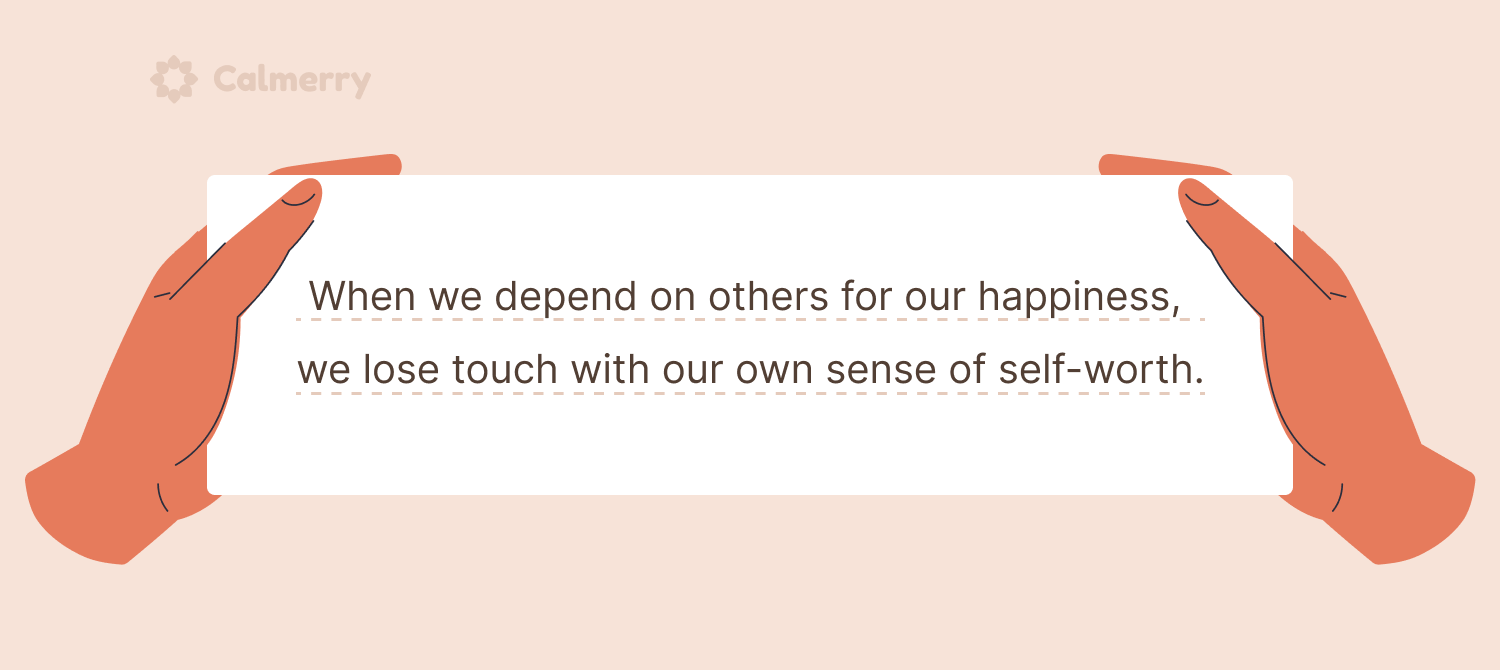
In codependent relationships, relationships can become everything. Codependency can damage our self-esteem, make us stay in abusive relationships, and leave us feeling trapped, helpless, lonely, and unworthy. When we depend on others for our happiness, we lose touch with our own sense of self-worth.
Also, studies have shown that codependency is linked to depression, anxiety, eating disorders, and stress-related disorders.
So, if you find yourself always needing someone else to complete you, maybe it’s time to take a step back and learn how to be happy on your own.
Codependency vs. interdependency
It’s important to understand that not all “dependencies” are bad. There’s nothing wrong with needing help, connections, and support from our loved ones, just as much as having the desire to care, show empathy, and be compassionate towards them as well.
In fact, it’s actually healthy to have a close, supportive relationship where you and your partner can always rely on each other. However, there is a big difference between codependency and interdependency.
Unlike codependency, which is characterized by an unhealthy imbalance of power, interdependency is a much healthier, balanced way to relate to others. It’s based on the idea of mutually beneficial relationships where both parties feel supported and respected.
An interdependent relationship is built on mutual trust, respect, love, support, and healthy communication. Both partners are equally invested in a relationship and each other’s well-being. Still, each person has their own sense of self-worth, and partners also know they’re capable of standing on their own two feet.
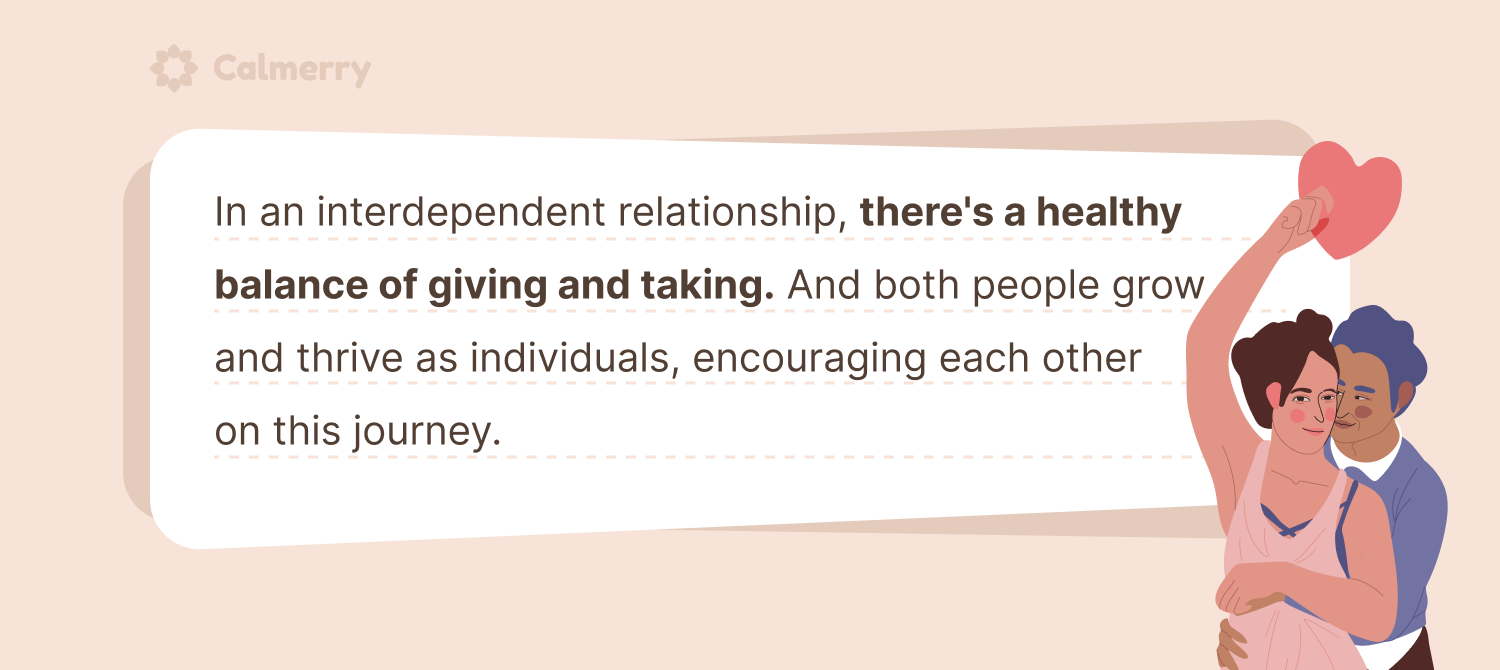
In an interdependent relationship, there’s a healthy balance of giving and taking. And both people grow and thrive as individuals, encouraging each other on this journey.
24 signs of codependency in a relationship
The signs of codependency are easy to miss. It’s normal to make small sacrifices for someone you love. However, you may notice when you neglect your own needs for the sake of others. Knowing what to watch out for can help you identify when your or your partner’s codependent patterns begin.
If you’re in a codependent relationship, you may:
- Feel like you’re always walking on eggshells, afraid of saying or doing something that will upset your partner
- Support your loved one at the cost of your own mental, emotional, and physical health
- Feel that your partner’s happiness is your ultimate priority
- Be extremely afraid of abandonment and loneliness
- Struggle with boundaries
- Feel that your relationship is one-sided
- Prioritize someone else’s needs over your own
- Notice manipulative behaviors
- Have a fear of rejection
- Find it difficult to say “no,” although some of the requests drain your time and energy
- Feel that your self-worth is often tied to the other person
- Have different levels of commitment with your significant other
- Try to avoid arguments and conflicts at all costs
- Feel like you can’t live without your partner and want to be always around them
- Resort to criticism, ultimatums, nagging, or tantrums in an attempt to control their behavior
- Experience extreme jealousy
- Sacrifice your comfort just to get them to stay in the relationship
- Feel that your self-esteem is drastically lower when you’re in a relationship than when you’re single
- Have a strong need to fix or rescue others
- Tend to attract emotionally unavailable partners
- Have difficulty or feeling guilty for communicating your wants, values, and needs
- Have little or no interests outside your relationship
- Struggle to leave someone who hurts you
- Or exhibit emotional or physical abuse to prevent a partner from leaving
What causes codependency (an incomplete list of factors)
While it’s not fully understood what causes codependency, there are some theories. And many of them are associated with deep-rooted childhood experiences.
Attachment theory
Everyone learns how to form attachments to loved ones and themselves while growing up. However, not everyone learns healthy ways to do it. Psychologists use Attachment Theory to explain how one’s childhood may lead to codependency in adult relationships.
If your caregiver was absent, dismissive, or unpredictable, there is a high likelihood of you becoming codependent in your relationships. You might have felt emotionally neglected and developed a fear of abandonment. So now, you put the needs of others ahead of yours to stop your loved ones from leaving.
Learned behaviors
Children learn codependency by watching and imitating family members who display similar behavior. If you grew up watching your caregivers in a codependent relationship, you might repeat the pattern.
You’re likely to have a codependent relationship pattern if you witnessed someone in your family do any of the following:
- Constantly cover up for someone who has a substance addiction
- Stay in relationships despite physical or emotional abuse
- Care for someone with chronic physical or mental illness long-term
- Live with narcissistic, borderline, or dependent personality disorder
Abuse
Adults abused as children have anger, safety, trust, and authority issues. They might have an extreme need for approval and go to great lengths to make others happy.
The abuse might have been physical, verbal, emotional, or sexual. Because their trust was broken and they didn’t feel safe as children, they may not know what a healthy relationship looks like as adults. Or, they may also seek toxic and abusive ones because they’re familiar with this type of relationship.
If you’re a survivor, remember that it isn’t your fault. You deserve to lead a happy and fulfilling life as well as have meaningful and healthy relationships.
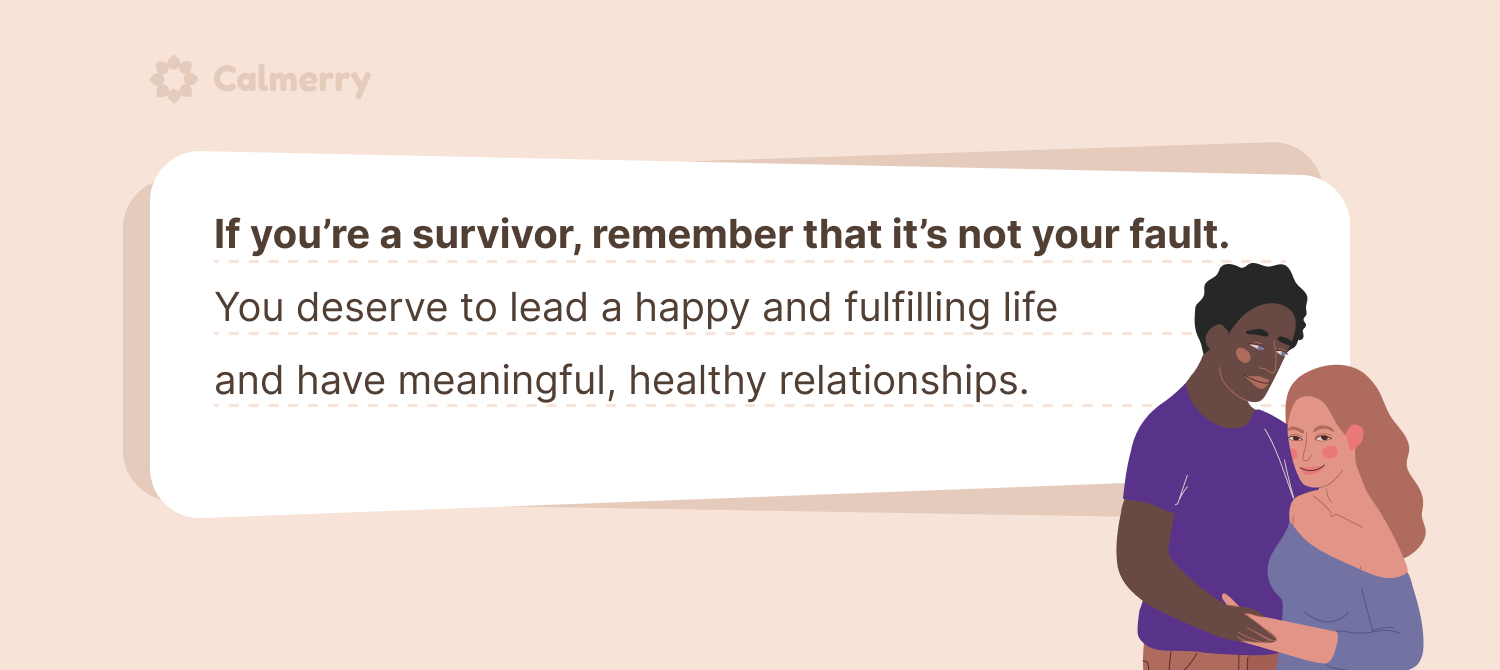
Unfortunately, the effects of abuse can be far-reaching and long-lasting. You might feel like you’re never going to recover, but it’s possible to heal and move on. With the right support, you can start rebuilding your life on your own terms.
7 tips on how to stop being codependent + Calmerry therapist’s insights
Figuring out how to overcome codependency can seem like a difficult task. You probably have had the same habits for years and don’t know where to start. Whatever the causes, codependency is a learned behavior that you can unlearn.
It’s possible to break free from it with time, effort, patience, and professional help. Together with the Calmerry therapist – Diamond Thaxton, a Licensed Mental Health Counselor, – we gathered 7 effective ways to overcome codependency and share them with you below.
1. Identify patterns in your relationships
The first step to changing any codependent behaviors is acknowledging that they exist. It’s not always easy to see when we’re being codependent because it can feel like we’re just “good partners.”
Besides, codependency doesn’t always look the same to everybody. Perhaps you resort to manipulation or say “yes” even to the things you don’t like to avoid confrontation. Or, you may sacrifice too much for others. Reflect on your past and present relationships to understand which patterns are unique to you.
2. Learn what healthy relationships look like
To understand how to break codependency habits, you need to identify healthy ones.
The Licensed Mental Health Counselor Diamond Thaxton suggests taking inventory of what you believe love is in a relationship: “Do you think love should be blissful, like in fairytales or Romeo and Juliet? These stories are often the glamorization of codependent relationships. Sometimes you must remind yourself that those are stories for a reason and that reality is a little bit more complicated than that.”
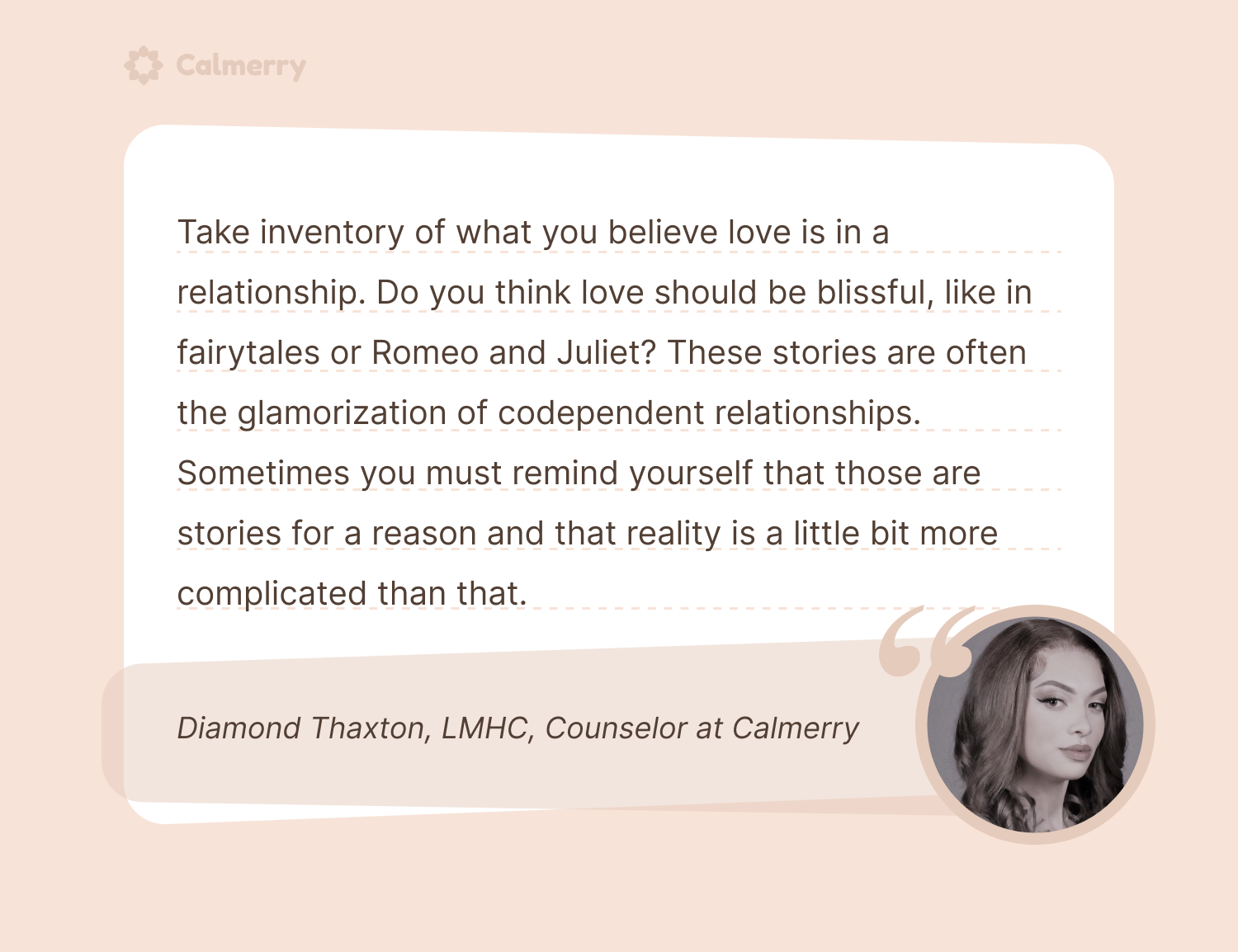
Healthy, loving relationships aren’t about all-consuming, addictive love that dissipates your identity. And they’re not about the cancelation of your life outside them.
Instead, they involve making time for each other while maintaining your own lives and striking a balance between togetherness and independence. This adds more enjoyment to a relationship and creates even more space for love, trust, growth, and positive well-being of both people.
3. Discover your needs and desires – and prioritize your self-growth
If you’re codependent, you probably tend to base your sense of self-worth on pleasing others and meeting their needs. Or, you can experience fear, guilt, and anger while communicating yours. As a result, you may find it difficult to even know what you want or need and lose your life purpose. Unfortunately, codependency can substitute your life for someone else’s life.
Diamond explains how to avoid it: “One of the best ways to be done with codependency is to be sure that you’re living a life full of purpose and one that you’re passionate about.
Many people are in codependent relationships to escape reality and distract themselves from doing the work needed in their lives.”
So by rediscovering your needs, life goals, interests, and passions, you find what it takes for you to live a fulfilling, authentic life. All in all, a codependent relationship is about your relationship with yourself.
Try not to feel guilty for focusing on yourself and prioritizing your self-growth – take time to learn new crafts, exercise, meditate, and do whatever makes you happy. Eat healthy foods, drink plenty of water, get enough rest, and take care of your mental health.
As you pay more attention to yourself, you realize that you can give yourself most things you need. And by following your needs and wants, you see that you don’t need to rely on someone for all your well-being.
4. Set boundaries
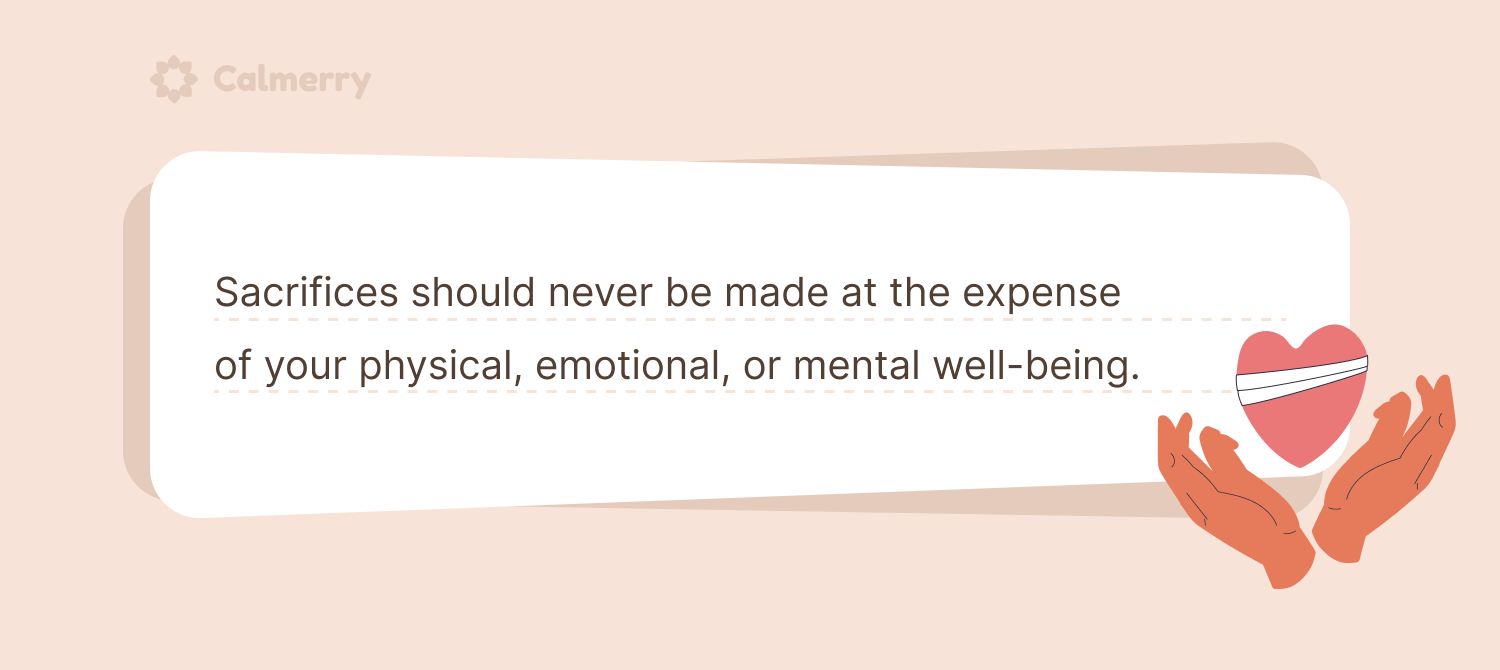
Now that you know what you need, you should ask for it and stick to your guns. It’s nice to make small sacrifices for people you love. However, there should be a limit to how far you’re willing to go. Sacrifices should never be made at the expense of your physical, emotional, or mental well-being.
Be clear about what you’re not willing to compromise on. Know that establishing boundaries doesn’t mean being unreasonable. Instead, it’s a form of self-preservation and self-care.
5. Know your attachment style
Diamond Thaxton notes that people in codependent relationships usually have an anxious-attachment style, which needs to be addressed first to end codependency for good.
Also, our counselor recommends an excellent book to start with self-healing of anxious-attachment style – Attached by Dr. Amir Levine and Rachel S.F Heller.
6. Resist the urge to fix, control, or save others
If you have codependent behaviors, you probably have an impulse to fix or save others. However, sometimes our well-intentioned efforts can do more harm than good.
Being conscious of your triggers and codependent behaviors is a great way to overcome them. When we try to fix, control, or save others, we often do so out of a need to feel needed or helpful. But often, the best you can do to show your love is offer your support and be there for them when they need it.
Doing so shows your loved one that they can trust you. You provide them with a safe space for their growth while supporting and encouraging them.
7. Consider therapy for codependency
Codependency is a difficult pattern to break on your own. Because some habits are learned from childhood, you might need professional help, such as online relationship counseling, to unlearn them. If you’re struggling with codependency, there’s no shame in seeking support from a licensed therapist.
Therapy can provide the help and guidance you need to make lasting changes. In therapy, you’ll explore the underlying causes of your behavior and how it affects your life.
With the help of a professional, you can begin to build healthier, more satisfying relationships with yourself and others.
Can a codependent relationship be saved?…And work?
A codependent relationship is not doomed – you can work on it with your partner. Yet, creating healthy patterns and breaking codependent behavior requires a lot of commitment and effort from both people. But how to tell if it’s worth it? Diamond Thaxton explains:
“It must also be considered to determine if the relationship is healthy or toxic. If the relationship is more on the healthy side by being absent of emotional, verbal, or physical abuse, you may be able to work with your partner about setting boundaries and working through how to be interdependent instead. You will need to do an inventory of the relationship about possible changes in how you communicate with each other, changing the amount of time you are together, and reviewing specific boundaries around money, sex, and relationship agreements.”
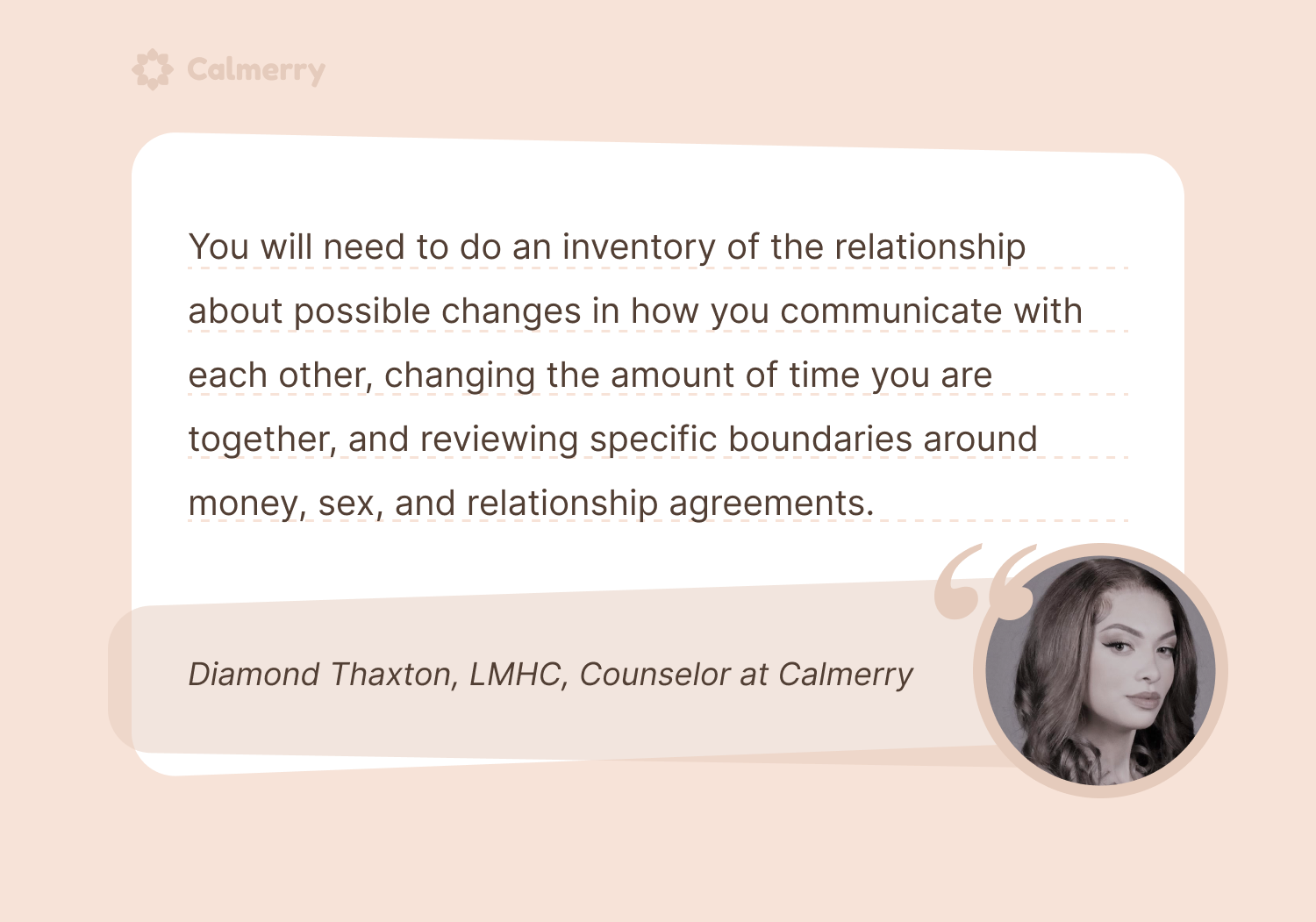
Some final words before you go
Codependency stems from traumatic or abusive childhood experiences. Although you cannot change your past, you can change your present. Breaking codependency habits allows you to have healthy relationships with your partner, family, friends, co-workers, and yourself.
Know that you’re worthy of love and respect, even if it doesn’t come from your loved one. You’re capable of pursuing your own dreams, even if they don’t include someone else. And know that you’re strong enough to be happy and whole without someone else “completing” you.
Get professional support today to start developing self-reliance and leading a fulfilling life.
online therapy
live video session

